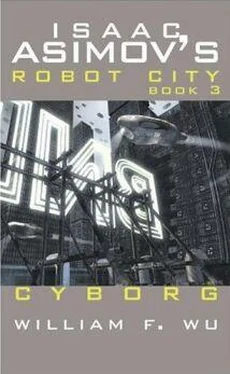William Wu - Cyborg
Здесь есть возможность читать онлайн «William Wu - Cyborg» весь текст электронной книги совершенно бесплатно (целиком полную версию без сокращений). В некоторых случаях можно слушать аудио, скачать через торрент в формате fb2 и присутствует краткое содержание. Год выпуска: 2004, ISBN: 2004, Издательство: I Books, Жанр: Фантастика и фэнтези, на английском языке. Описание произведения, (предисловие) а так же отзывы посетителей доступны на портале библиотеки ЛибКат.
- Название:Cyborg
- Автор:
- Издательство:I Books
- Жанр:
- Год:2004
- ISBN:ISBN: 0-743-47918-1
- Рейтинг книги:5 / 5. Голосов: 1
-
Избранное:Добавить в избранное
- Отзывы:
-
Ваша оценка:
- 100
- 1
- 2
- 3
- 4
- 5
Cyborg: краткое содержание, описание и аннотация
Предлагаем к чтению аннотацию, описание, краткое содержание или предисловие (зависит от того, что написал сам автор книги «Cyborg»). Если вы не нашли необходимую информацию о книге — напишите в комментариях, мы постараемся отыскать её.
Cyborg — читать онлайн бесплатно полную книгу (весь текст) целиком
Ниже представлен текст книги, разбитый по страницам. Система сохранения места последней прочитанной страницы, позволяет с удобством читать онлайн бесплатно книгу «Cyborg», без необходимости каждый раз заново искать на чём Вы остановились. Поставьте закладку, и сможете в любой момент перейти на страницу, на которой закончили чтение.
Интервал:
Закладка:
The computer gave him nothing on recent soft landings of spacecraft, or crashes. Nor had there been any reported sightings of landed spacecraft. Astronomical observations had not recorded any craft in orbit, either. He had to assume that either the sensors had failed in some way, or that the information was simply lost in the computer.
Food, he thought. The visitors required nutrition. That was still the best lead he had, if he could only think of a way to exploit it.
Ariel walked out of the tunnel stop and located the coordinates of the last sighting of the visitors without any trouble. Her only problem was what to do next. She was in the middle of the city, standing still as a moderately heavy traffic of robots passed her, either on slidewalks or in vehicles.
“Well, what would I do for food here?” she asked herself out loud. “Ask around, I suppose.”
As always, the robots were moving with their single-minded deliberation. The bland buildings reflected that attitude in their austere efficiency of design. No stranger, she reflected, would expect to find food in this neighborhood.
She stopped the nearest robot passing, by calling out, “I am a human who needs questions answered. Stop.”
The robot stopped.
“Have you seen a robot traveling with a human child?”
“No.”
“Do you know where I might find food?”
“Food. This is the energy source for humans, is it not?”
“Yes. It must be provided in a certain chemical form.”
“I am not familiar with it. I do not know where to locate any. Are you in urgent need of energy?”
“I’m not,” said Ariel, “but I think a small human in the company of a certain robot probably is. Almost definitely. I need to find them before the child starves. That is, runs out of energy.”
“This constitutes a First Law requirement, then. I will help you search for them.”
“Identify.” Ariel suddenly realized that this argument could be used to harness every robot in Robot City.
“I am Courier Foreman 189.”
“You supervise couriers? What do they do?”
“Couriers are function robots that carry small items to specific locations. Objects and distance vary.”
“All right. Listen. You don’t have to interrupt your work at all. Just spread the word to other humanoid robots as you go about your duties that a First Law problem requires their aid in locating a human child in the company of a robot, and also another human wandering around by himself.”
“Understood.”
“And tell them not to include me-I’m Ariel Welsh-or Derec.”
“Understood. I will contact other robots through my comlink.”
“Good! I have to tell Derec about this right away.” Ariel turned and ran for the tunnel stop.
Chapter 9. Just One Of The Crowd
Jeff decided, after numerous glances back over his shoulder, that he had finally lost his pursuit. He had run blindly, turning corners and dodging behind robots and vehicles and buildings every time he could, before slowing down. He was not out of breath, or even tired, but he was disoriented and scared.
He didn’t know where he was going, or even why he had run. Right now, he just wanted to be alone. He eyed warily other robots that he passed, but they paid him no particular attention. Either the medical staff had not yet put any word out, or his physical traits carried no designation they could use to identify him. The thought that he would not have to run every minute bolstered his spirits a little. The total lack of humans dampened them again.
The entire situation just didn’t seem real. It was absurd. How could he, Jeff Leong, eighteen years old, recently accepted into college, a healthy and fairly normal Auroran…be a robot?
He walked. He walked straight, turned corners and then found a slidewalk and got on it. With nowhere to go and nothing to do, he just kept walking along the slidewalk.
At first, his senses were still askew. His eyes were not only more sensitive than before, but they seemed to see in a much wider range of the spectrum. He found himself looking at colors, as he termed them, that he had never seen before and had no name for-and they unnerved him. Gradually, he learned to shut out most of the unwanted light waves. The same had occurred with his hearing. It had been so acute at first that all sounds had reached him in a kind of jumble. Then he had been able, by concentrating, to reduce his hearing acuity to a level that felt comfortable. He had been intrigued by the added abilities, but he would have to learn how to control them.
The walking also helped him become more familiar with his new body. It responded smoothly and efficiently, with good balance and control. He couldn’t complain about that. Before long, he had concluded that he was moving enough like the other robots, the real ones, to escape notice.
He also looked over the robots he passed, as nonchalantly as he could, in search of identifying marks. The robots bore differences, certainly, especially where job-related equipment was concerned on the non-humanoid ones. He saw several distinct but subtle pattern differences repeated on many of the humanoid robots, and guessed they represented minor engineering improvements on robots that had been made or repaired at different times. If they had individual identification, however, he was too much of a stranger here to see it.
Gradually, he found himself moving in a consistent direction. The population seemed denser that way, perhaps toward the center of the urban area. All the robots seemed intent on their own occupations, and he grew more confident that he could lose himself in the crowd.
Yet, he still had nothing to do and nowhere to go.
Ahead of him, through a crowd of robots, he thought he saw a girl, or young woman, emerge from some kind of underground entrance. With a surge of excitement, he quickened his pace and leaned to one side to look between two other robots. When they glanced at him, he straightened in alarm.
He could see her walking the other way. If he wanted to avoid notice, he would have to act with the same deliberate manner as all the robots around him. He lengthened his stride and gave chase without otherwise altering his body language.
Not far ahead, she had stopped to speak to a robot. Jeff slowed down as he approached, and stopped when her back was to him. He was a good distance away by human standards, but after a moment of effort, he was able to sharpen his hearing enough to eavesdrop.
“Identify yourself,” she was saying.
“I am Tunnel Foreman 41,” said the robot.
“I’m Ariel. Please spread the word about the First Law obligation I’ve described.”
“I must,” said Tunnel Foreman 41.
The robot departed and Ariel started to go. Then she saw Jeff watching her, and she paused.
“The First Law?” Jeff asked. He wanted to continue his masquerade as a robot until he knew something about her.
“Yes,” said Ariel. “We’re looking for two people who are probably starving in Robot City. One is a child traveling with a robot and the other is alone. The First Law requires that all robots help locate them.”
“Of course,” said Jeff, suddenly realizing that of course this did not apply to him. He still had his human brain, and the imperative of the Laws was located in the positronic brains of the robots. Yet if he revealed this, his identity would be known to anyone aware of the transplant and his subsequent escape.
“Report any sightings of them to the central computer,” Ariel went on. “Detain them if you can, without violating the Laws. We’ll see that they’re fed.”
“I understand,” said Jeff. He was trying frantically to think of a question, anything, to learn more about her without giving himself away.
Читать дальшеИнтервал:
Закладка:
Похожие книги на «Cyborg»
Представляем Вашему вниманию похожие книги на «Cyborg» списком для выбора. Мы отобрали схожую по названию и смыслу литературу в надежде предоставить читателям больше вариантов отыскать новые, интересные, ещё непрочитанные произведения.
Обсуждение, отзывы о книге «Cyborg» и просто собственные мнения читателей. Оставьте ваши комментарии, напишите, что Вы думаете о произведении, его смысле или главных героях. Укажите что конкретно понравилось, а что нет, и почему Вы так считаете.












